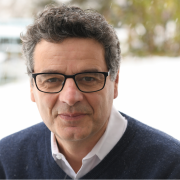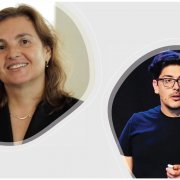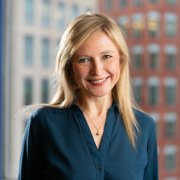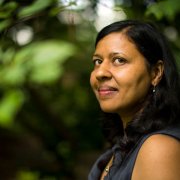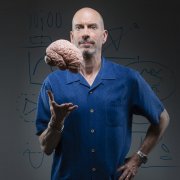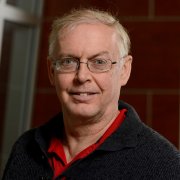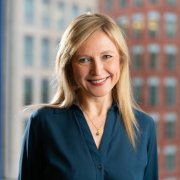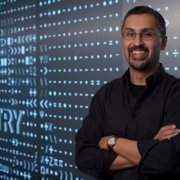March 22, 2022 - 2:00 pm
Virtual (Zoom)
Alexander Borst, Max-Planck-Institute of Neurobiology, Martinsried, Germany
This talk will be fully remote via a Zoom Webinar.
Detecting the direction of image motion is important for visual navigation, predator avoidance and prey capture, and thus essential for the survival of all animals that have eyes. However, the direction of motion is not explicitly represented at...
Detecting the direction of image motion is important for visual navigation, predator avoidance and prey capture, and thus essential for the survival of all animals that have eyes. However, the direction of motion is not explicitly represented at...
February 22, 2022 - 4:00 pm
Prof. Petros Koumoutsakos, Harvard University
The Spring 2022 Brains, Minds, and Machines (BMM) Seminar Series will be hosted in a hybrid format. Please see the information included below regarding attending the event either in-person or remotely via Zoom connection
Please note, MIT is requiring that all attendees, including MIT COVIDpass...
Please note, MIT is requiring that all attendees, including MIT COVIDpass...
December 7, 2021 - 4:00 pm
Singleton Auditorium (46-3002)
Prof. Michale Fee, Department Head & Dorflinger Professor, Dept. Brain and Cognitive Sciences;...
The Fall 2021 Brains, Minds, and Machines (BMM) Seminar Series will be hosted in a hybrid format. Please see the information included below regarding attending the event either in-person or remotely via Zoom connection
Please note, MIT is requiring that all attendees, including MIT COVIDpass users...
Please note, MIT is requiring that all attendees, including MIT COVIDpass users...
November 9, 2021 - 9:00 am
This seminar talk will be hosted remotely via Zoom.
Andrea E. Martin, Lise Meitner Group Leader, Max-Planck Institute for Psycholinguistics
Research website:...
This seminar talk will be hosted remotely via Zoom; no in-person attendance.
Hosted by: Sam Gershman
Abstract: Human language is a fundamental biological signal with computational properties that are markedly different than in other perception-action systems: hierarchical relationships between...
Hosted by: Sam Gershman
Abstract: Human language is a fundamental biological signal with computational properties that are markedly different than in other perception-action systems: hierarchical relationships between...
October 5, 2021 - 4:00 pm
Singleton Auditorium (46-3002)
Prof. Daniela Rus, Director of the Computer Science and Artificial Intelligence Laboratory (CSAIL) , Deputy...
The Fall 2021 Brains, Minds, and Machines (BMM) Seminar Series will be hosted in a hybrid format.
Please see the information included below regarding attending the event either in-person or remotely via Zoom connection
Abstract: In this talk, we will discuss the nuts and bolts of the novel...
Please see the information included below regarding attending the event either in-person or remotely via Zoom connection
Abstract: In this talk, we will discuss the nuts and bolts of the novel...
September 21, 2021 - 4:00 pm
Singleton Auditorium (46-3002)
Prof. Aude Oliva, Senior Research Scientist, CSAIL; MIT Director MIT-IBM Watson AI Lab; Director MIT Quest...
Abstract: The human brain is a time machine; We are constantly remembering our past, and projecting ourselves into the future. Capturing the brain’s response as these moments unfold could yield valuable insights into both how the brain works and how to better design human-centered AI systems. In...
September 14, 2021 - 4:00 pm
Singleton Auditorium (46-3002)
Prof. Ila Fiete, MIBR, BCS Dept., MIT
The Fall 2021 Brains, Minds, and Machines (BMM) Seminar Series will be hosted in a hybrid format.
Please see the information included below regarding attending the event either in-person or remotely via Zoom connection
Abstract: Episodic memory involves fragmenting the continuous stream of...
Please see the information included below regarding attending the event either in-person or remotely via Zoom connection
Abstract: Episodic memory involves fragmenting the continuous stream of...
June 15, 2021 - 2:00 pm
This seminar talk will be hosted remotely via Zoom.
Guangyu Robert Yang, Dept. of Brain and Cognitive Sciences (BCS), EECS Dept., Schwarzman College of...
Abstract: Recurrent Neural Networks (RNNs) trained with machine learning techniques on cognitive tasks have become a widely accepted tool for neuroscientists. In comparison to traditional computational models in neuroscience, RNNs can offer substantial advantages at explaining complex behavior and...
June 8, 2021 - 2:00 pm
This seminar talk will be hosted remotely via Zoom.
Prof. Robert D. Nowak, University of Wisconsin-Madison
Abstract: This talk presents a variational framework to understand the properties of functions learned by neural networks fit to data. The framework is based on total variation semi-norms defined in the Radon domain, which is naturally suited to the analysis of neural activation functions (ridge...
May 11, 2021 - 4:00 pm
Prof. Earl K. Miller, Picower Institute for Learning and Memory, BCS Dept., MIT
Host: Prof. Matt Wilson (MIT)
Abstract: Working memory is the sketchpad of consciousness, the fundamental mechanism the brain uses to gain volitional control over its thoughts and actions. For the past 50 years, working memory has been thought to rely on cortical neurons that fire continuous...
Abstract: Working memory is the sketchpad of consciousness, the fundamental mechanism the brain uses to gain volitional control over its thoughts and actions. For the past 50 years, working memory has been thought to rely on cortical neurons that fire continuous...
May 4, 2021 - 2:30 pm
Hosted via Zoom
Prof. Alan L. Yuille (JHU)
Abstract: Current AI visual algorithms are very limited compared to the robustness and flexibility of the human visual system. These limitations, however, are often obscured by the standard performance measures (SPMs) used to evaluate vision algorithms which favor data-driven methods. SPMs, however...
March 30, 2021 - 4:00 pm
Hosted via Zoom
Prof. Aude Oliva, Senior Research Scientist, CSAIL; MIT Director MIT-IBM Watson AI Lab; Director MIT Quest...
Dear Friends,
Unfortunately, Prof. Aude Oliva is feeling unwell and we have canceled today’s talk “Mapping Responses in the Human Brain Through Space and Time.” We will reschedule this talk in the near future.
---
Host: Prof. Leyla Isik (JHU)
Abstract: The human brain is a time machine; We are...
Unfortunately, Prof. Aude Oliva is feeling unwell and we have canceled today’s talk “Mapping Responses in the Human Brain Through Space and Time.” We will reschedule this talk in the near future.
---
Host: Prof. Leyla Isik (JHU)
Abstract: The human brain is a time machine; We are...
March 2, 2021 - 2:00 pm
Prof. Murray Shanahan, Imperial College London
Host: Prof. Josh Tenenbaum (MIT)
Abstract: The challenge of endowing computers with common sense remains one of the major obstacles to achieving the sort of general artificial intelligence envisioned by the field’s founders. A large part of human common sense pertains to the physics of the...
Abstract: The challenge of endowing computers with common sense remains one of the major obstacles to achieving the sort of general artificial intelligence envisioned by the field’s founders. A large part of human common sense pertains to the physics of the...
CBMM Brains, Minds, and Machines Seminar Series: Computation and Learning with Assemblies of Neurons
February 23, 2021 - 4:00 pm
Prof. Santosh Vempala, Georgia Tech.
Host: Prof. Tomaso Poggio (MIT)
Abstract: Despite great advances in ML, and in our understanding of the brain at the level of neurons, synapses, and neural circuits, we still have no satisfactory explanation for the brain's performance in perception, cognition, language, memory, behavior; as Nobel...
Abstract: Despite great advances in ML, and in our understanding of the brain at the level of neurons, synapses, and neural circuits, we still have no satisfactory explanation for the brain's performance in perception, cognition, language, memory, behavior; as Nobel...
November 3, 2020 - 4:00 pm
Nick Roy, CSAIL, AeroAstro, MIT
Abstract: In the last few years, the ability for robots to understand and operate in the world around them has advanced considerably. Examples include the growing number of self-driving car systems, the considerable work in robot mapping, and the growing interest in home and service robots. However...


